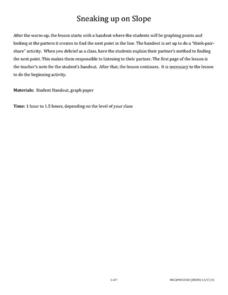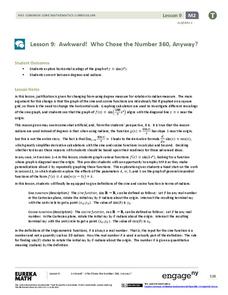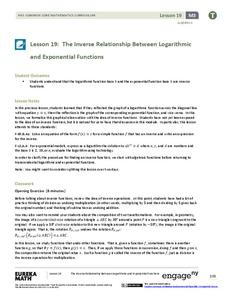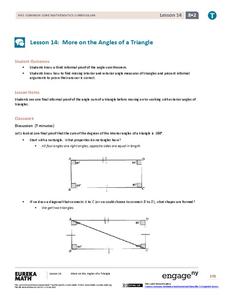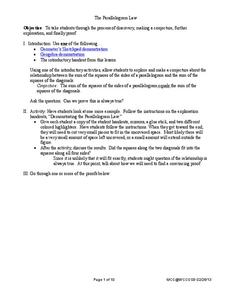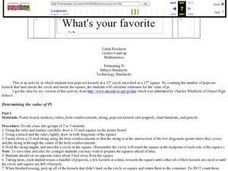West Contra Costa Unified School District
Sneaking Up on Slope
Pupils determine the pattern in collinear points in order to determine the next point in a sequence. Using the definition of slope, they practice using the slope formula, and finish the activity with three different ways to determine the...
Willow Tree
The Pythagorean Theorem
There isn't a more popular geometry formula than the Pythagorean Theorem! Learners understand the special side relationships in a right triangle. They use the Pythagorean Theorem to find missing sides and to solve problems. They begin...
EngageNY
Awkward! Who Chose the Number 360, Anyway?
Don't give your classes the third degree. Use radians instead! While working with degrees, learners find that they are not efficient and explore radians as an alternative. They convert between the two measures and use radians with the...
EngageNY
Multiplying and Factoring Polynomial Expressions (part 2)
If you can multiply binomials, you can factor trinomials! This is the premise for a instructional activity on factoring. Pupils look for patterns in the binomials they multiply and apply them in reverse. Examples include leading...
EngageNY
The Inverse Relationship Between Logarithmic and Exponential Functions
Introducing inverse functions! The 20th installment of a 35-part lesson encourages scholars to learn the definition of inverse functions and how to find them. The lesson considers all types of functions, not just exponential and...
Mathematics Vision Project
Module 5: Modeling with Geometry
Solids come in many shapes and sizes. Using geometry, scholars create two-dimensional cross-sections of various three-dimensional objects. They develop the lesson further by finding the volume of solids. The module then shifts to finding...
EngageNY
Special Lines in Triangles (part 2)
Medians, midsegments, altitudes, oh my! Pupils study the properties of the median of a triangle, initially examining a proof utilizing midsegments to determine the length ratio of a median. They then use the information to find missing...
EngageNY
Properties of Parallelograms
Everyone knows that opposite sides of a parallelogram are congruent, but can you prove it? Challenge pupils to use triangle congruence to prove properties of quadrilaterals. Learners complete formal two-column proofs before moving on to...
EngageNY
More on the Angles of a Triangle
Angles and triangles: they're all connected. Uncover the connections between angles in triangles. Scholars learn how to find both exterior and interior angle measures in triangles. The lesson emphasizes the vocabulary related to these...
Virginia Department of Education
Pythagorean Theorem
Investigate the meaning of the Pythagorean Theorem through modeling. After comparing the area of the square of each side, individuals cut triangles and squares to facilitate the comparison.
DiscoverE
Build a Plankton Net
Give household materials new life by turning them into a plankton net. Scholars design and build a net to collect and filter plankton from water. They test out their creations by using glitter to represent plankton. The nets need to...
DiscoverE
Strong Paper Structure
Paper is a lot stronger than you think. Scholars create newspaper structures that can hold the weight of several books. For the purpose of this activity, the designs must be eight inches tall to be considered complete.
PBS
Paper Table
What is black and white and re(a)d all over? Class members build a table out of rolled newspapers. Pupils follow the design process to design, build, and test their paper tables in the second challenge in a series of five.
Novelinks
Zach’s Lie: Magic Squares
Individuals match vocabulary words within a magic square, a concept that ties in nicely with math class. The words are all located in Zach's Lie and were specifically selected to increase comprehension of the text. Fifth in a series of...
101 Questions
Snail's Pace
Time doesn't fly when you're watching a snail cross a sidewalk. Combining the concepts of the Pythagorean Theorem and the distance, rate, and time formula, learners determine how long it takes a snail to go from one corner of a sidewalk...
Weber State University
The Sun and the Seasons
Why is there more daylight in June than in December if you live above the equator? How does the angle of sunlight shift throughout the year? Answer these questions and more with an interactive article about the sun, its path through the...
Curated OER
Addition Patterns
Use a learning activity with your youngsters in order to establish an understanding of patterns in a small addition table. Help learners recognize that adding two odd numbers will produce an even number, and adding two even numbers will...
Illustrative Mathematics
Is This a Parallelogram?
If both pairs of opposite sides of a quadrilateral are congruent, is the quadrilateral a parallelogram? This task asks learners to determine the answer and to support their answer with a proof. The resource includes a commentary for...
West Contra Costa Unified School District
The Parallelogram Law
Use your pupils' sense of curiosity to explore the Parallelogram Law. Here is an activity that outlines a complete lesson from beginning to end, allowing pupils to follow a conjecture through to the proof stage.
Curated OER
Beef and Beef By-Products
Learners examine the various types of beef and the many uses of its by-products. They increase their knowledge by playing a game of "beef bingo."They discuss what parts of beef animals are their by-products.
Curated OER
Investigation - Patterns/Functions
Learners will display the first five rows of Pascal's Triangle and discuss in their groups what patterns they see in the rows of numbers. They will give responses and discuss that these numbers form what is called Pascal's Triangle.
Curated OER
Investigation-How Many Toothpicks?
Seventh graders use toothpicks to investigate a series of designs and identify patterns. Data is organized and analyzed using tables and graphs, and students make generalizations using algebraic expressions.
Curated OER
What's your favorite pi?
Sixth graders toss popcorn kernels at a 12? circle inscribed in a 12? square. By counting the number of popcorn kernels that land inside the circle and inside the square the students calculate estimates for the value of pi.
Curated OER
Caley Table for the Symmetries of a Square
Middle and high schoolers complete Caley's table to indicate rotating a square 90, 180, and 270 degrees. They also reflect a square across the vertical and horizontal line. This one-page worksheet contains eight movements.
Other popular searches
- Diagonal Lines
- Quadrilateral Diagonal
- Horizontal Diagonal Vertical
- Diagonal Length
- Diagonal Distance
- Diagonals of Polygons
- Diagonals of Quadrilaterals
- Box Diagonal
- Diagonals of a Polygon
- Diagonals in Shapes
- Diagonal Method
- Diagonals in a Polygon


